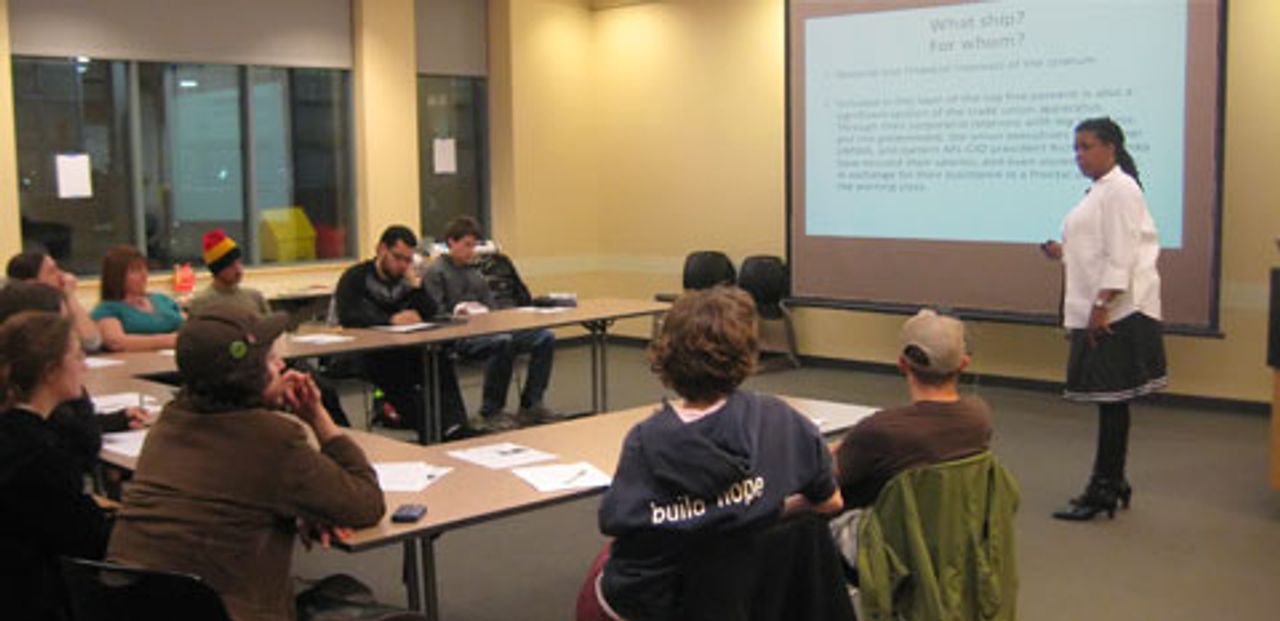SEP vice presidential candidate Phyllis Scherrer completed her tour of upstate New York on Tuesday and Wednesday, speaking at two meetings in Ithaca and one in Syracuse.
Syracuse is a former center of manufacturing. It is located along the Erie Canal, once a major shipping route connecting Buffalo on Lake Erie to the state capital of Albany on the Hudson River. Much of industry has been shut down over the past several decades, as it has throughout upstate New York and the American Midwest. (See, “SEP campaign takes socialist program to Syracuse, New York”)
 Scherrer speaks at Cornell and Tompkins County Public Library
Scherrer speaks at Cornell and Tompkins County Public Library Ithaca is a smaller town about 60 miles southwest of Syracuse. It is home to Cornell University, a major Ivy League school, as well as Ithaca College. The SEP held two meetings, one at Cornell and the other at a local public library.
In all of the meetings, Scherrer reviewed the basis of the SEP’s campaign, including the fight against social inequality, the attack on democratic rights, and the danger of war.
“The level of social inequality in the United States and the world is staggering,” Scherrer said in Ithaca. “The world’s richest individuals, those whose net worth is at least $30 million, have as much money as half of the world’s entire gross domestic product.”
“Class tensions are reaching a boiling point,” she said. “We saw the beginnings of that last year with Wisconsin, Egypt and the Occupy protests.” The American ruling class is shredding constitutional rights and preparing new wars abroad, which will have incalculable consequences.
 Some of those attending the Ithaca meeting
Some of those attending the Ithaca meeting“A war against Iran or Syria,” Scherrer explained, “would inevitably draw China, Russia or both into a much larger engagement, possibly escalating into a Third World War. World War I started with infantry and ended with tanks. World War II started with tanks and ended with nuclear weapons. A new world war would start with nuclear weapons. We’d like to think we understand the consequences of that, but we don’t. We can’t grasp the kind of devastation that would bring.”
At all the meetings, the vice presidential candidate stressed the urgent need to build a new political leadership in the working class, in opposition to the Democratic Party and all its “left” supporters. “The working class must build its own leadership in opposition to capitalism. This is the program of the SEP, and it is why are running in these elections.”
Scherrer fielded a variety of questions at the meetings on the SEP’s program, its position on other political tendencies, and its historical foundations.
In contrast to other organizations that call themselves socialist, Scherrer said in response to one question, “We stand in the traditions and legacy of the October Revolution of 1917. Our movement, founded by Leon Trotsky, was based on an unrelenting opposition to the betrayals of Stalinism.” We have a long historical tradition of defending principles, Scherrer explained.
“Other organizations do not have the same level of respect for history that we do. Most have none at all. That is because they in some shape or form are subservient to the Democratic Party and want to hide this from workers. We also say to workers, ‘Here is our history. Read it. We have no secrets. We’re confident you’ll see very clearly where we stand in relation to these other groups and the working class itself, and that you’ll see the correctness of our positions.’”
Terry, who attended the meeting in Syracuse, asked about the SEP’s attitude to the Green Party. “The Greens do not oppose capitalism. They seek its reform,” Scherrer replied. “They do not call for an expropriation of the banks or a change in property relations. They focus on environmental issues, without addressing the larger context, the capitalist system, which is responsible for environmental degradation.” Where the Green Party has come to power in other countries, such as Germany, it has pursued a right-wing, pro-capitalist and pro-war policy.
Another person attending the meeting in Syracuse asked about the SEP’s analysis of countries in Scandinavia. “Are those countries socialist?”
Scherrer responded by explaining that socialism means a change in property relations, in which the working class takes control of the economy and runs it democratically, in the interest of social need. “Those countries still have a ruling elite that exploits the working class, whatever reforms may exist. Moreover, those reforms were a product of the deep fear of the ruling elite after October 1917 that workers worldwide would rise up against the old order. The reforms are a remnant of that era. Now they are all being eliminated, including in Europe.”
Asked whether there is an example of a successful socialist revolution, Scherrer again turned to the experiences of the Russian Revolution. “The Russian Revolution was betrayed, a product of its international isolation and the rise of a bureaucratic caste that was hostile to everything the revolution stood for. However, it does not change the fact that the working class did indeed take power and improved the standard of living for millions in the Soviet Union.”
Discussions in both cities lasted well beyond the end of the meeting, taking up such issues as the PATCO strike of 1981 and its relationship to the transformation of the AFL-CIO, and the Chinese Revolution of 1927.
The meetings are a strong basis for the development of the SEP campaign in upstate New York. For more information and to get involved, visit socialequality.com.
